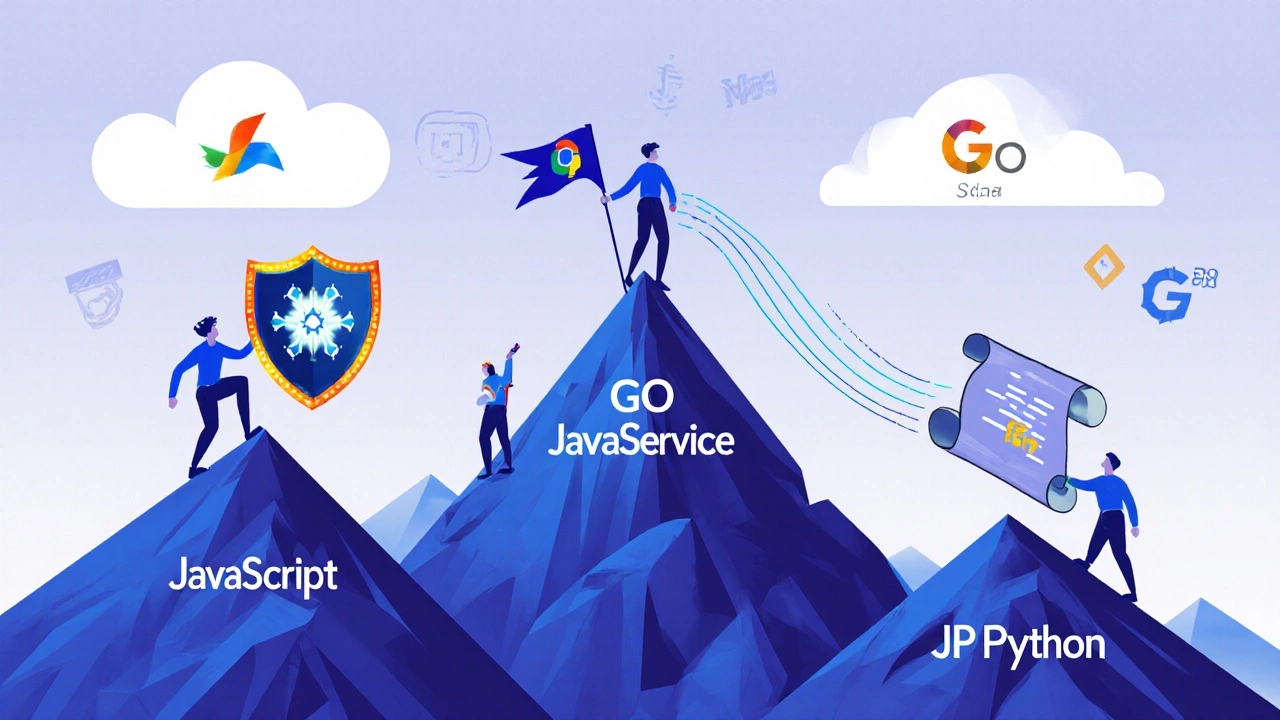Coding Salary Calculator 2025
Your Salary Estimate
How It Works
This calculator shows estimated annual salaries based on data from real job postings in late 2025. Salaries reflect average earnings for experienced developers working with the specified language in your selected country.
The highest salaries come from languages with low supply and high demand. Companies pay premium rates for developers who can solve critical problems in finance, security, and systems programming.
Select a language and country to see your estimated salary.
If you're learning to code because you want to earn more, you're not alone. Every year, people ask: which coding language has the highest salary? The answer isn't simple - it changes fast, depends on where you live, and what kind of work you do. But in 2025, there are clear leaders. And knowing them could help you pick the right path - not just for pay, but for real, long-term career growth.
Python isn't the highest payer anymore - but it's still everywhere
Python used to be the golden child of high salaries. It’s easy to learn, used in AI, data science, and automation, and taught in most coding bootcamps. But in 2025, its average salary has settled. In the UK, Python developers earn around £58,000 per year. In the US, it’s closer to $110,000. That’s solid - but not top-tier anymore.
Why? Because Python became too common. Every startup, every bank, every school teaches it. That means more people know it. And when supply goes up, salaries don’t shoot through the roof. Still, Python is your foundation. If you want to get into machine learning, cloud automation, or scientific computing, you need it. But if you’re chasing the highest paycheck, you’ll need to go deeper.
The real money is in specialized, low-supply languages
The highest salaries aren’t going to the most popular languages. They’re going to the ones that are hard to find. Companies pay more when they can’t hire enough people. That’s why languages like Rust, Go, and Scala are pulling ahead.
Rust, for example, is used by Microsoft, Amazon, and Meta for building secure, fast systems. It’s not taught in most intro courses. Fewer than 10% of developers know it well. In the UK, Rust developers average £82,000. In the US, it’s $145,000. Why? Because Rust prevents memory leaks and crashes - critical for financial systems, operating systems, and cybersecurity tools. If you can write safe, high-performance code in Rust, companies will fight to hire you.
Go (Golang) is another. It powers Google’s internal tools, Uber’s backend, and Docker. It’s simpler than C++, faster than Java, and perfect for cloud services. Go developers in London earn £75,000 on average. In San Francisco, it’s $138,000. And demand keeps rising as more companies move to microservices and containerized apps.
Scala and Kotlin: The hidden kings of finance and Android
If you’re looking at finance - banks, hedge funds, trading platforms - Scala is still king. It runs on the JVM and handles massive data streams better than most languages. JP Morgan, Goldman Sachs, and Barclays still rely on Scala for their core systems. Scala developers in the UK earn £85,000+. In New York, it’s over $150,000. That’s because Scala is complex. It blends functional and object-oriented programming. Fewer people master it. And those who do? They’re rare.
Kotlin is different. It’s the official language for Android development since 2019. But most devs still use Java. That means Kotlin talent is thin on the ground. Android apps are everywhere - banking, healthcare, ride-sharing. Companies need developers who can build fast, modern Android apps with Kotlin. In Manchester, Kotlin developers make £68,000. In the US, it’s $120,000. And with Apple’s push into wearables and foldables, Android demand isn’t slowing down.
Why not JavaScript or TypeScript?
JavaScript is everywhere. So is TypeScript - its stricter cousin. They power most websites, from small blogs to Netflix and Airbnb. But salaries? They’re average. JavaScript developers in the UK make £52,000. TypeScript? £58,000. That’s good - but not exceptional.
Why? Because there are millions of JavaScript devs. You can hire one from a freelance site for £20/hour. That drives down rates. Unless you’re building complex front-end systems with React, Angular, or Vue at scale - and even then, the pay bump is small. If you’re good at TypeScript and know state management, APIs, and testing, you’ll do well. But you won’t be topping the salary charts.

What about C++ and C#?
C++ still runs video games, trading algorithms, and embedded systems. If you work for Sony, NVIDIA, or a hedge fund, you might need it. Salaries are high - £70,000 in the UK, $125,000 in the US. But the field is shrinking. Fewer new projects use C++. It’s hard to learn. And most universities don’t teach it anymore.
C# is different. It’s Microsoft’s baby. Used in enterprise apps, Windows software, and Unity game development. In the UK, C# devs earn £62,000. In the US, $105,000. It’s steady. Reliable. But not explosive. If you’re stuck in a corporate environment using .NET, C# is your language. But it won’t make you rich unless you’re building something huge.
Real-world examples: Who’s paying the most?
Let’s look at actual job postings from late 2025:
- A fintech startup in London is offering £90,000 for a Rust developer to build secure transaction systems.
- A Silicon Valley AI lab is paying $160,000 for a Scala engineer to manage real-time data pipelines.
- A German car manufacturer is hiring Kotlin devs at €75,000 to build connected car apps.
- A cybersecurity firm in Boston is offering $155,000 for Go developers to optimize cloud security tools.
Notice a pattern? These aren’t just any jobs. They’re roles where failure = money lost, data leaked, or systems down. That’s why companies pay more. They need people who can build rock-solid software - not just code that works.
It’s not just the language - it’s what you build with it
Here’s the truth: The language matters, but your skills matter more. A Rust developer who only knows syntax won’t earn £80k. But one who understands concurrency, memory safety, and system architecture? That’s the person companies pay for.
Same with Go. If you can deploy microservices on Kubernetes, write REST APIs, and optimize Docker containers - you’re golden. The language is just the tool. The value is in your ability to solve hard problems.
Companies don’t hire you for knowing Python. They hire you because you automated their billing system, reduced server costs by 40%, or built a machine learning model that predicts customer churn. The language is how you do it. The impact is why they pay you.

What should you learn if you want the highest salary?
Here’s a simple roadmap for 2025:
- Start with Python or JavaScript - they’re easy, and you’ll learn core concepts fast.
- Learn one systems language: Rust or Go. Pick Rust if you care about security and performance. Pick Go if you want cloud and backend work.
- Specialize: Learn how to use your language in a high-value field - AI, cybersecurity, finance, or mobile apps.
- Build real projects: Don’t just follow tutorials. Make something that solves a problem. Put it on GitHub.
- Network: Join communities. Go to meetups. Talk to people who are already doing the work you want.
Don’t chase the language. Chase the problems that pay well. Then use the right tool to solve them.
Salary comparison: Top 5 coding languages in 2025
| Language | UK Average Salary | US Average Salary | Demand Level | Best For |
|---|---|---|---|---|
| Rust | £82,000 | $145,000 | Low | Systems programming, security, fintech |
| Scala | £85,000 | $150,000+ | Low | Finance, big data, distributed systems |
| Go (Golang) | £75,000 | $138,000 | Medium | Cloud, microservices, DevOps |
| Kotlin | £68,000 | $120,000 | Medium | Android apps, mobile development |
| Python | £58,000 | $110,000 | High | AI, data, automation, general dev |
What’s next after you pick a language?
Learning a language is just step one. The real work starts after that.
- Build a portfolio with 3 real projects - not tutorials. Make one that solves a problem you care about.
- Learn how to use Git and GitHub. Employers check these before interviews.
- Practice explaining your code. Most tech interviews are about communication, not just typing.
- Apply to junior roles even if you don’t feel ready. Experience beats theory every time.
- Keep learning. The top earners are the ones who never stop.
There’s no magic language that guarantees riches. But if you combine a high-demand skill with real-world experience, you’ll earn more than 90% of developers.
Is Python still worth learning in 2025?
Yes - but not as your only language. Python is the best way to start learning programming. It’s used in AI, data analysis, scripting, and automation. But if you want the highest salaries, you’ll need to pair it with a systems language like Rust or Go. Think of Python as your foundation, not your finish line.
Do I need a degree to earn a high salary in coding?
No. Most top-paid developers in 2025 don’t have computer science degrees. They have portfolios, GitHub repos, and real project experience. Companies like Google and Meta now hire based on skills tests and coding challenges. A bootcamp or self-taught path works fine - if you can prove you can solve hard problems.
Which language is easiest to learn for a beginner?
JavaScript and Python are the easiest for beginners. Both have clear syntax, huge communities, and free learning resources. Start with one, build small projects, and get comfortable with how code works. Then move to a harder language like Rust or Go when you’re ready for more challenge.
Are coding salaries higher in the US than the UK?
Yes - but the cost of living is higher too. A $145,000 salary in San Francisco buys less than £82,000 in Manchester. When comparing salaries, always look at purchasing power, not just numbers. The UK has strong tech hubs in London, Manchester, and Edinburgh, and salaries are rising fast.
Should I learn multiple languages at once?
No. Learning two languages at once confuses most beginners. Master one first - build projects, solve problems, get feedback. Then add a second language when you’re ready. Most top earners know 2-3 languages deeply, not 10 superficially.
Final thought: Pick the language that solves the problems you care about
The highest salary isn’t the point. The point is doing work that matters - and getting paid well for it. If you love building apps for hospitals, learn Kotlin. If you’re obsessed with security, learn Rust. If you want to work on cloud infrastructure, learn Go.
Money follows impact. Not the other way around.
